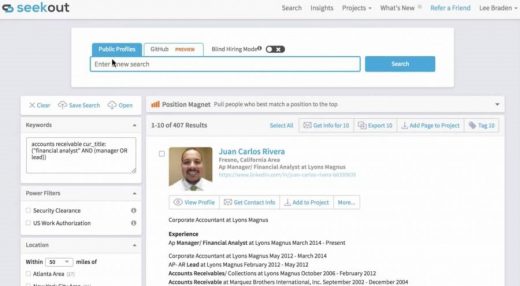The Role of AI in Recruitment (+ Top 7 AI Recruiting Tools)
The Role of AI in Recruitment (+ Top 7 AI Recruiting Tools)

Artificial intelligence is gaining more and more attention. Intelligent self-learning programs disrupt many industries, including eCommerce, manufacturing and production lines, transportation, agriculture, logistics and supply chain, and more. Moreover, such programs automate redundant processes and don’t require a high level of creativity, increasing its overall effectiveness.
“It is difficult to think of an industry that AI will not transform. This includes healthcare, education, transportation, retail, communications, and agriculture. There are surprisingly clear paths for AI to make a big difference in all of these industries.” – Andrew Ng, Founder, and CEO of Landing AI
Innovative Application of AI in Recruitment
These disruptive forces have started hitting the HR industry as well. And it’s not just a trend; the innovations brought by AI are going to stay. Moreover, it’s anything but a temporary phenomenon. The most recent development in HR technology is AI in recruitment. The changes brought by AI in recruitment will be significant since many recruitment aspects have redundant, time-consuming tasks that can be easily automated.
Apart from that, AI can bring innovative solutions to the new-age emerging problems faced in HR and recruitment, like managing a multi-generational workforce, rising mental health issues, promotion, or inclusive culture.
The entire HR industry will be going under major changes while AI makes their jobs easier, faster, and better.
This article will explore the role of AI in recruitment, its possible use cases, top tools available in the market to automate recruitment processes, potential challenges attached with the adoption of AI, and its overall impact.
The Role of AI in Recruitment — nine helps for recruitment
-
Intelligent Screening
According to 52% of talent acquisition leaders, the most challenging part of recruitment is screening and short-listing candidates from a large talent pool. When integrated with applicant tracking software (ATS), an AI screening software can make hiring recommendations by utilizing data like candidates’ performance, merits, experience, etc.
The AI screening software can learn from existing candidates’ experience and skillsets and make recommendations accordingly.
Screening resumes still make up for the largest part of a recruiters’ daily schedule. Implementation of AI for resume screening can free up recruiters’ time to a great extent enabling them to screen effectively from the shortlisted candidates.
-
Recruiter Chatbots
AI chatbots for recruitment work as recruiter’s assistant where chatbots can collect candidates’ basic information like education, experience and ask basic screening questions. Based on the inputs, the chatbot can rank the recruiter candidates saving their time and efforts.
Chatbots can also resolve candidates’ doubts that fall into frequently asked questions and set up interviews with worthy candidates, thereby automating almost 80% of top-of-the-funnel/pre-screening activities.
-
Automated Candidate Sourcing
Sourcing candidates to build the recruitment pipeline is a time-consuming and challenging task. AI for candidate sourcing can extend recruiters’ reach as artificial intelligence can scan millions of profiles in a matter of seconds from multiple job portals, social media platforms, and more.
Normally, a recruiter takes about 6 secs to scan a single resume, and a single corporate job opening attracts around 250 resumes. That’s almost 3-4 working days’ worth of just scanning resumes for a single position. AI can automate this part of the process, and recruiters can focus on the hiring process’s next levels.
-
Candidate Rediscovery
Since AI can go through heaps and heaps of data in seconds, it will optimally use your company’s database of past candidates. So, rather than spending a great deal of money on sourcing new candidates, you can utilize the existing candidate pool to find a strong candidate who might be fit for existing job openings.
-
Hiring Remote Workers
Around 3.2% of the entire workforce of the USA works remotely. And almost 16% of companies hire remote worlds exclusively.
The numbers will grow from here on out since the pandemic redefined the working culture for many companies.
This means it will get harder for recruiters to hire people since hiring remote workers comes with its own set of challenges. However, using AI-powered pre-assessment tools, video interviews combined with a hint of AI, and more can enable recruiters to hire better and faster.
-
Diversity Hiring
Recruiters can expand their efforts for diversity hiring by implementing AI-powered solutions. For example, a startup called Gapjumpersdotme uses AI to analyze your current screening, hiring, and promotion processes, blind hiring, and creating inclusive job ads.
Around 56% of candidates believe AI may be less biased than recruiters, and about 49% think that implementing AI might increase their chances of getting hired.
Recruiters might be aware of their conscious biases, but it might be possible to be unaware of subconscious biases. And it’s becoming more and more important to promote diversity in the workplace since it improves employee productivity, happiness, retention, creativity, and more.
-
Facial Expression Analysis
Video interviews can save an ample amount of time for both the parties, candidates and employers. And video interviews with AI in the mix can analyze a candidate’s expressions, capture and analyze their moods, assess their personality traits, and more.
Big companies like Unilever, Dunkin’ Donuts, IBM, etc., already use AI in their video interviews and claim that it has increased ethnic and socioeconomic diversity in their hiring.
-
Customized Employee Value Propositions
Your employee value propositions can’t follow the doctrine of “one fit for all.” Every employee has a different set of skills, experience, and more importantly, their needs, goals, and aspirations are unique to them.
What’s valuable to one employee can be useless to the other. For example, an employee living within 2 miles from the office building won’t use company vehicles or car services. On the other hand, an employee who lives in the suburbs with a good 25 miles between their house and the office will be grateful to have a company vehicle or car service.
Providing custom-tailored value propositions to your employees can result in improved productivity and a happier workforce.
AI can analyze your employees’ behavior, personality traits, and more to personalize your company’s value proposition to an employee.
Such personalization can help you craft lucrative offers for the high-demand candidates, directly improving your overall conversion rates.
-
Quicker background checks
Background check is an essential part of the hiring process. This is the stage where the recruiter verifies the candidate’s credentials, experience, education, etc. Conventionally, this process is quite tedious and time-consuming.
But with AI-powered tools, this process can be made efficient, private, unbiased, and faster.
Checkr is one such platform that automates the process of background checks with its AI-powered solutions. Their solutions are used by companies like Netflix, Airbnb, Instacart, etc.
Here are 7 top AI-enabled tools you may find useful
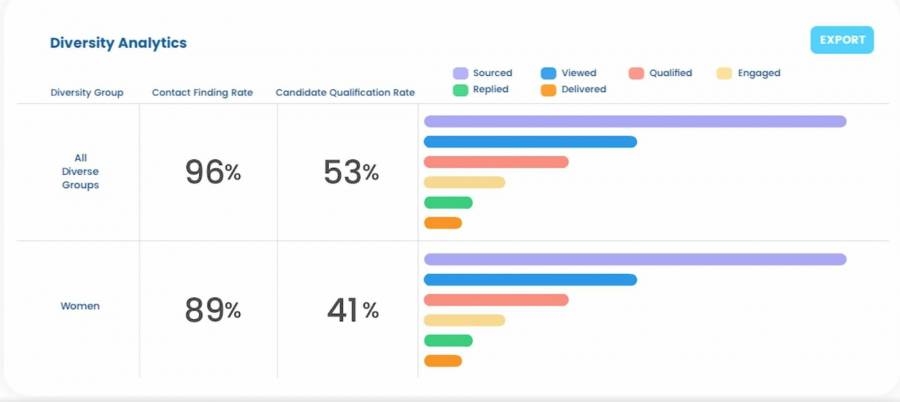
Companies like Nike, General Dynamics, Intel, and Wayfair, Hiretual helps your talent sourcing teams source and engage the right applicants for opening job positions. Their tools provide a set of features like AI sourcing, market insights for creating effective hiring strategies, personalized outreach with candidates, diversity & inclusive hiring, and 30+ ATS integrations that fetch the right data in real-time.
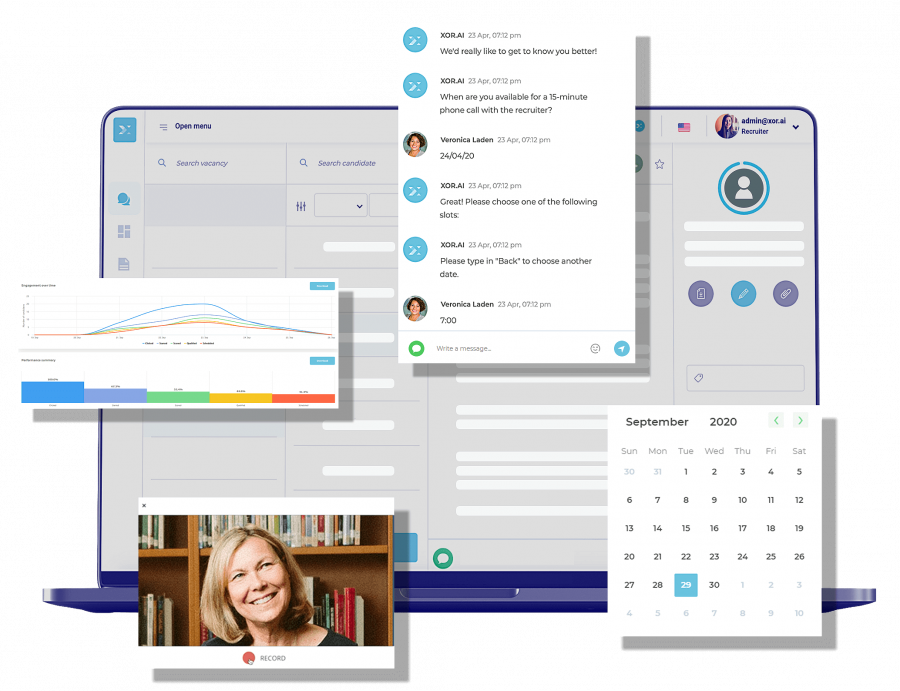
Used by companies like McDonald’s, MARS, MOL Group, and ExxonMobil, XOR helps attract, engage, and recruit candidates efficiently. They offer features like live chat, virtual career fairs, WhatsApp campaigns, on-demand video interviews, recruiter and HR connect, and more.
XOR modernizes your recruitment processes and allows your HR and recruitment teams to leverage the power of AI, the internet, and social media platforms from one platform.
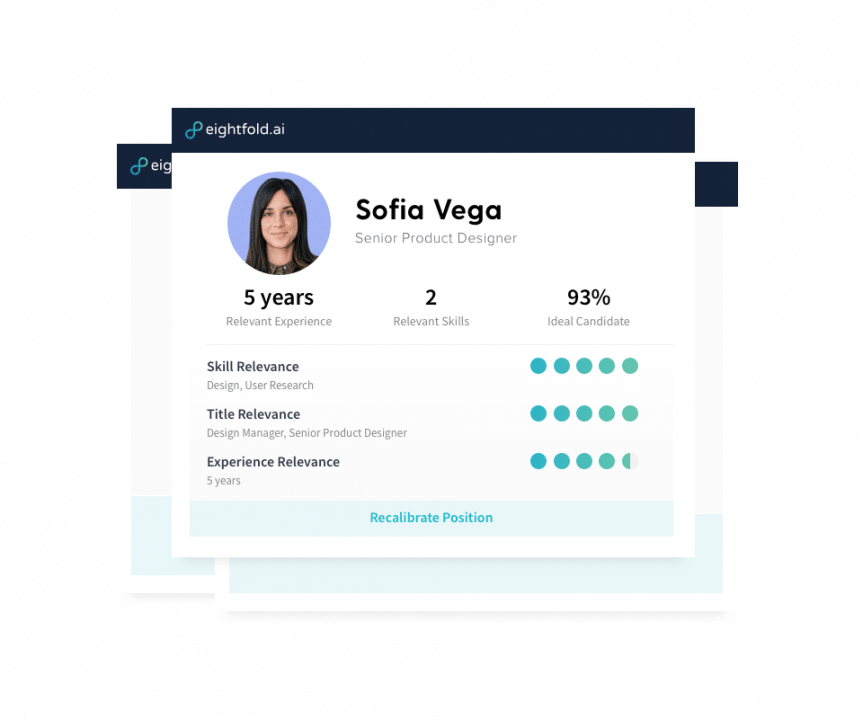
Used by companies like AirAsia, TATA Communications, HULU, and Twilio, Eightfold uses AI to guide your career site visitors to the right job openings. Further, they provide talent acquisition, talent diversity, talent management, and talent experience solutions to streamline every recruitment process aspect.
The conversion rates drastically increase with Eightfold.ai in the picture because of their predictions.
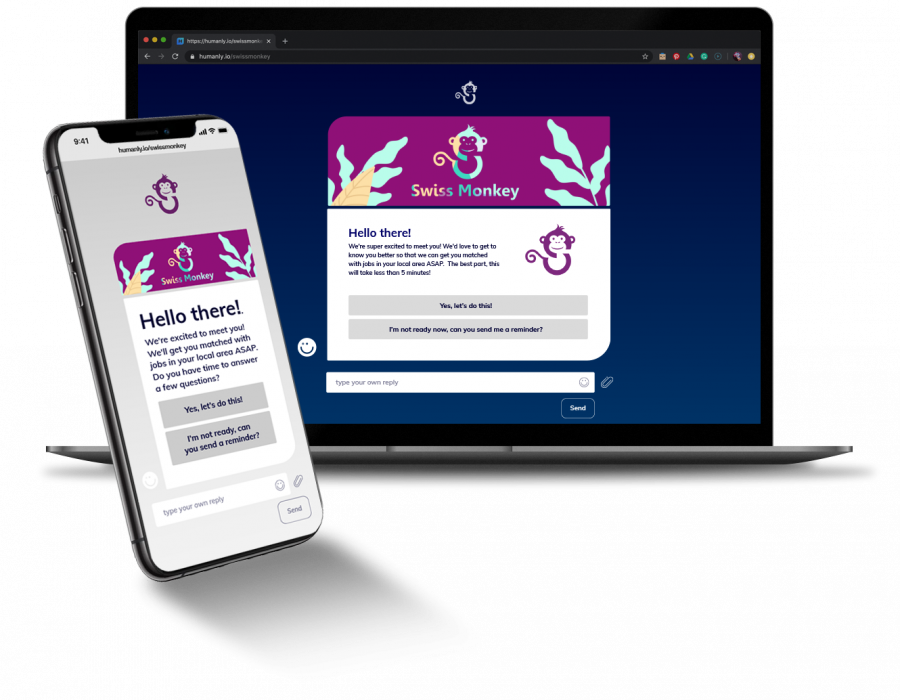
Humanly is a recruitment tool that majorly focuses on diversity hiring and seamlessly integrates with top ATS vendors. With their AI-powered chatbots, your recruitment team can automate candidates’ screening and interview scheduling in a DEI (diversity ethnicity inclusivity) friendly manner.
Used by Armoire, Tiny Pulse, Swiss Monkey, Oakland Roots, and BPM, Humanly claims to have saved over 60 hours scheduling and screening per job opening and 95% completion of background checks within 48 hours.
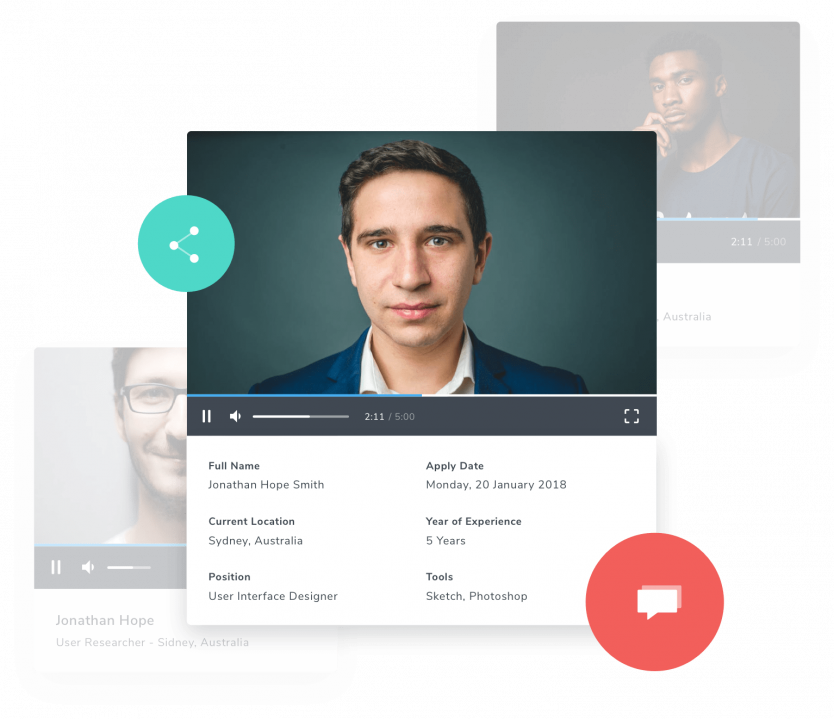
Used by companies like Chick-a-fila, Six Flags, Ocada Group, Agoda, and B&M, MyInterview leverages the power of AI and machine learning to analyze candidates’ answers for professionalism, reasoning, and more.
Their tools provide candidate insights using deep analytics and empower recruiters to customize their candidates’ experiences. For example, you can review interviews, shortlist candidates, collaborate with stakeholders more efficiently.
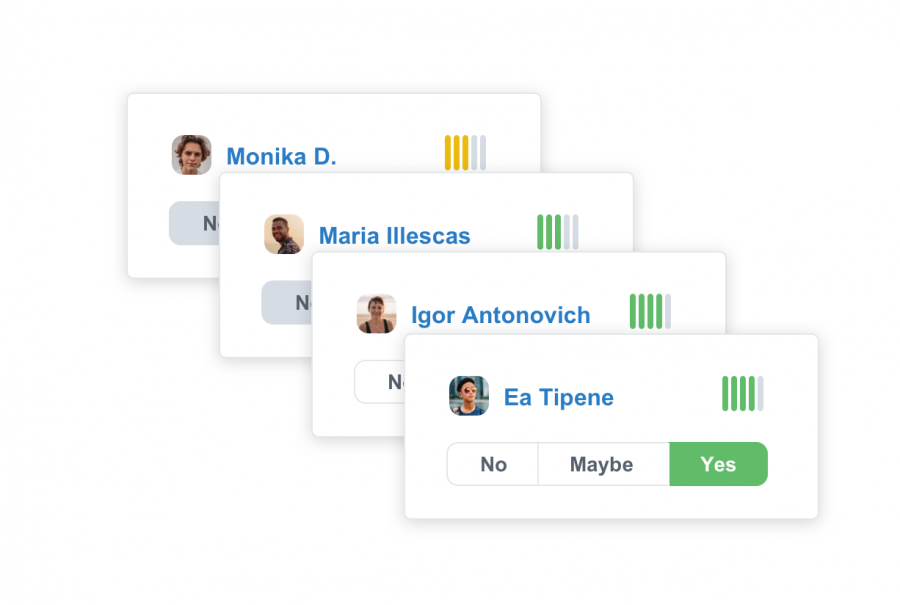
Used by Amazon, Onpartners, CT Assist, Three Pillars, and more, Loxo is a hiring and recruitment automation platform. It is a complete HR CRM that comes equipped with recruitment CRM, a talent intelligence system, and an application tracking system.
Known for their modern features like smart grids and task management, Loxo claims to have an updated database of over 530 million people and over 98% customer satisfaction rate.
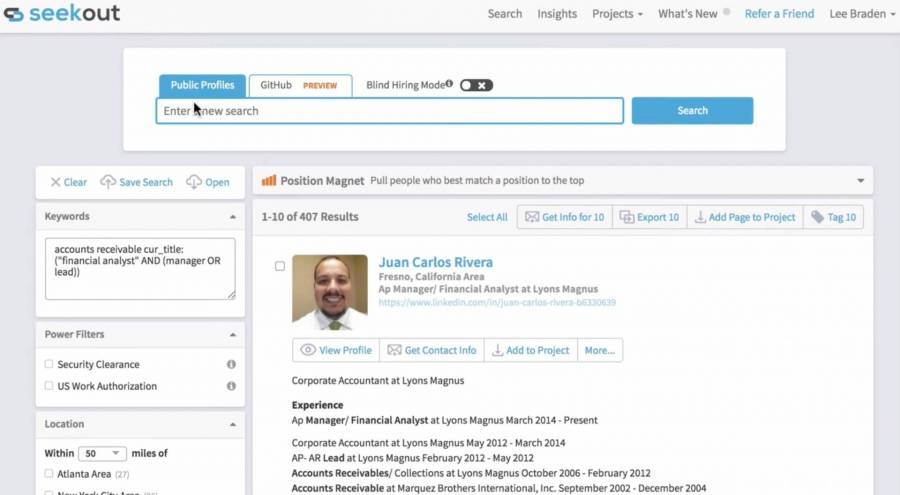
Used by the likes of Twitter, Salesforce, Waymo, and Rover, Seekout is an AI-powered talent search engine that lets you search for talent in a way that’s comfortable for you. You can use their search engine for direct search, boolean search, and apply power filters or leverage AI matching benefits.
Seekout’s AI can shortlist candidates based on the job description added. This list is curated either from its own 500 million talent profiles or from your ATS. Additionally, you can reach out to the candidates with personalized messages and automated outreach sequences.
Other prominent features that they provide are talent analysis, candidate engagement, diversity hiring, and more.
You can also download their chrome extension that provides an added level of ease to your recruitment process.
Impact of AI on Recruitment
-
Saves time
Roughly 75% to 88% of candidates applying for a particular position are underqualified or not a right fit. And for every job opening, it takes recruiters a good 23 hours to scan through all the applications and resumes.
More importantly, the volume of applications will increase in the near future, considering the recent developments in the unemployment rates because of the pandemic. At the same time, the recruitment and HR teams are predicted to remain the same size.
This only means that they’ll have to put in more effort with fewer than the necessary number of the hands-on deck.
Since AI can automate candidates’ screening and scheduling, it saves quite a lot of time and recruiters’ resources. And since you’ll be faster and efficient with your processes, the chances of losing a good candidate to your competitors become quite low.
-
The quality of hiring improves
The talent pool gets bigger and bigger every year unless the job listings are for unconventional roles. Then, the recruiters have to screen the entire talent pool to get to the right batch of candidates, which is tiring and time-consuming.
With AI in screening, recruiters will get a list of shortlisted candidates perfect for the jobs. Then, they will have to screen them further on the impersonal attributes like cultural fit, previous organizational behavior, etc. Needless to say, this drastically improves the quality of the hired candidates.
-
Better integration of analytics
AI-backed tools and software come equipped with high-level analytics, providing recruiters with insights about every aspect of their process. Using these insights, they can easily optimize their operations and make the most of their time and resources.
-
Improves candidate experience
AI tools like chatbots used for the pre-screening stage are online 24/7. This means whenever any candidates reach out to apply, ask questions, etc., the chatbots are there to clear their doubts and provide the necessary information regarding the job role and responsibilities, company overview, and more.
AI can provide candidates with detailed support throughout the application process, guiding them whenever they get stuck or solving their queries.
This improves their overall experience with the recruitment process and creates a positive image for your brand. This can translate into getting more referrals from the candidates, making it easier for recruiters to expand their reach without investing time or money.
Challenges of Adopting AI in Recruitment
-
Lack of human touch
Chatbot conversations can lack the human touch, can be perceived as robotic, and it is quite possible that the bots might not be able to parse human lingo, cultural context, everyday slang, etc.
Moreover, around 80% of candidates would prefer to have human interactions over AI-powered chats with bots.
The candidate’s experience might get impacted negatively by the use of AI.
-
Requires the input of a lot of data
To mimic human intelligence, AI-powered programs require the input of a great deal of data. If not, then you can’t expect accuracy in results generated from implementing AI-powered programs and tools.
Good recruiters judge candidates’ resumes based on their years of experience in dealing with candidates. Unfortunately, AI can’t mimic seasoned recruiters’ accuracy and judgment unless fed with heaps and heaps of data.
-
Can adopt human biases
AI-powered tools are created based on previous data. The data originated from years of recruiters’ screening of candidates. The chances of recruiters having tapped into their unconscious bias in their screening and hiring candidates are quite high.
So, the possibility of AI learning human biases is not lost on us.
The only way to ensure that your AI tools are not replicating human biases is to have a vendor that’s well-aware of such issues and has taken steps to remove patterns of such biases.
-
Can be taken with a grain of salt/skepticism
Changing old ways, adopting new technologies and practices can be hard, in general. As a result, it is quite possible that HR and recruitment professionals might take these tools and software with a grain of salt.
Learning to work with a new tool and process is as hard as unlearning old ways and processes.
-
Can be unreliable
AI can be unreliable in candidate screening, especially when it encounters unconventional resumes in new formats or fonts. For example, when the AI can’t recognize the resume’s pattern, it might end up rejecting a well-suited candidate for the position.
-
Can’t understand or measure impersonal data
It’s easier for AI to understand data like years of experience, education level, etc. But when it comes to impersonal attributes like cognitive aptitude, personality traits, cultural fit, soft skills, etc. might get lost on AI.
This means you can lose an excellent candidate if your entire requirement process is relying on AI-powered tools.
Final Thoughts
Nothing is perfect. Everything comes with its own set of pros and cons. AI in recruitment is the same.
On the one hand, you have recruitment not quite willing to adopt the latest technologies or fearing that it’ll replace them, which is quite true. But on the other hand, this will essentially lead to the increased importance of human work and human touch in the recruitment process.
In the entirety, the pros of implementing AI in recruitment outweigh the cons by large. However, let’s not forget that its pros are not limited to recruiters; AI positively impacts candidates’ experience, improves organizations’ efficiency and cultures, and helps form better teams.
The cost of not keeping up with the technology can be quite high, especially if your industry is saturated with many big players.
The key still remains in finding the right balance between automation and manual work. Keep the processes human requires a high level of creativity, empathy, and analyzing intangible attributes. Automate the ones that are repetitive and time-consuming.
The post The Role of AI in Recruitment (+ Top 7 AI Recruiting Tools) appeared first on ReadWrite.
(91)

